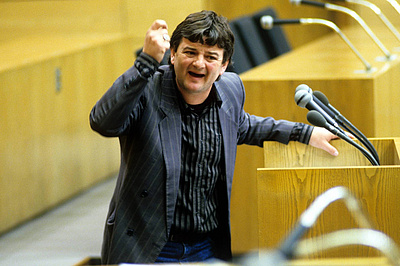Researcher: Judith Grosch

In politics, emotions are omnipresent. They both can be found in the speeches of the “hypersensitive” German Minister for Economic Affairs Robert Habeck about fears of the future as well as in the figure of the so-called “raging citizen”. Speaking your mind about emotions in the political field has recently become more evident than ever. In Germany especially, politicians have acknowledged their power over political discussions. This phenomenon points at a change in political culture. Public emotions are not only accepted but possibly even indispensable in political argument and rhetoric. But how exactly do emotions influence political decision-making? How are they being legitimized and/or “rationalized” again? And which kind of emotions exactly are deemed legitimate in the political discourse, while others are explicitly or implicitly shunned?

The Emotional Regime of the 1980s
The origins of said culture of emotions lie as early as in the 1970s. At that time, the left-wing alternative milieu, the feminist movement and the so-called “psycho-boom” de-pathologized common fears. These societal movements made emotions the basis of political action and the open articulation of feelings a critical requirement for everyday co-existence. The 1980s carried this new emotional regime into the political sphere in an even more extreme way: the environmental and peace movements drew their tremendous mobilizing power from the animation and positive revaluation of emotions in politics. This development culminated when the Green Party made it into the Bundestag. By then, a new emotionalized political rhetoric entered political debates on a national level in Germany.

Body-related Emotions
Body-related emotions played a vital role in the 1980s. On the one hand, there were fears of nuclear radiation, pesticides and genetic engineering, unhealthy industrial food, cancer, AIDS, heart attacks and stress-related diseases. On the other hand, a state-related political concern became tangible – fearing a government that would not sufficiently protect its citizens from these dangers. This very conflict manifested itself in a cult around nutrition, vegetarianism, yoga and other stress-management strategies, a boom in the fitness industry, and finally in political debates around health and the body, fueled by emotions such as fear, shame, trust, anger and outrage. These debates and the resulting political decisions are at the center of this project. The health reforms of 1989 and 1993 will provide a rough time frame for the investigation.
Eine Diskursanalyse des Moralischen
Und so gilt es, neben begriffsgeschichtlichen Analysen und quantitativen Auswertungen der legislativen Ergebnisse vor allem die politischen Debatten und die Räume, in denen sie stattfinden, diskursanalytisch zu untersuchen. Neben dem Moralisieren, also dem moralischen Sprechen, werden dabei auch die sprechenden Akteurinnen und Akteure selbst in den Blick genommen, mit Bezug auf die spezifischen Konstellationen, in denen sie stehen. Dabei spielen Geschlechts- und generationelle eine ebenso große Rolle wie die parteipolitische Zugehörigkeit und die Frage danach, ob man in der Regierung oder der Opposition sitzt. Im Gesamtergebnis entsteht eine Studie, die sowohl über wichtige politische Debatten, Konstellationen, Entscheidungen und ihre spezifische Entstehung im ausgehenden 20. Jahrhundert aufklären als auch dafür sensibilisieren möchte, welche Rolle Moral und ihre Aushandlung in gesellschaftspolitischen Diskursen eigentlich einnehmen. Denn: jede und jeder moralisiert. Die Frage ist am Ende nur, ob man es schafft, sich gegenseitig zuzuhören und Kompromisse für ein Zusammenarbeiten und -leben zu finden – trotz wohlmöglich stark divergierender Moralvorstellungen.

